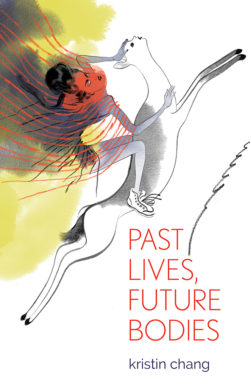Past Lives, Future Bodies
Kristin Chang
Black Lawrence Press, 2018
Paperback, 46 pages
Review by Brenna Womer
Kristin Chang offers death as a new way of life when a mother, “bloodless, a chalk / outline against white,” is realer in death than the father who lives, who sleeps sweet and lets fruit ripen to a bruise in his sugar-fist—“all survival,” he says, “is vengeance.”
Past Lives, Future Bodies is a record of violence: exoticism, murder and capitalism, beginnings; silence, language, jars of teeth, mouths and stomachs full of rot; family and memory and fire. When to be seen is as violent as apathy, when to be seen is still not to be rendered visible or acknowledged as whole, Chang writes, “I lose more & more / face every time a white woman / compliments my eyes.”
She points to the disconnect, the distance, between girl and self, myth and origin, language and meaning, “what men do” and “What women / remember.” This is not an easy book. Even at its most surreal—a mother reaching “into her blood / like a wallet, a wound / we eat out of”; “a girl with god / galloping her like a horse”; a bed as “an endless cutting / board”; and husbands who live in wives like house-fires—it is realer and truer to life than any dictionary definition or entry in a history book.
In Past Lives, Future Bodies, Chang never blinks, but, instead, demands language own up to its inadequacies, its tactful, willful ignorance and narcissism. She demands witnesses for the lives lived and given to this world by the women who came before, with their beginning-less voices: “Once, my mother / bent to drink from another / girl’s mouth.” A girl knows to provide before she even becomes a woman, “like fruit / fallen before it is ripe.” Even in death, a woman gives.
“What a daughter costs / a mother must pay / out of body” because of how many men know only what to do with idea of a woman, know only how to colonize a body, play god, say mine, say wife; how to force a woman of any age to her knees. But to resist a man is to become a crime—against sex and god and nature and love, against family. Chang writes, “My mother says / women who sleep with women / are redundant: the body symmetrical / to its crime.” And so it goes that a woman, who was once a girl, too, teaches her daughter what she herself was taught: “to hold / a knife like a man’s / hand, to teach it / the depth of my body”; “not / to flinch when he hits / bone.”
And then there is the catharsis, the purification by fire: “we renamed / our fathers by burning them / out of our bodies”; the want to “make meat / of men’s minds.” A woman asks of the Universe, “give me a king / to kill for my crown” or “a Chinese word for body / that does not also mean man.” The fantasy: for “men / to stop writing & / become mothers,” to take “turns / at thirst.”
In Past Lives, Future Bodies, Kristin Chang spells the body of a woman, raging against so much silence—against the expectation of man & wife, love’s endurance of all things, and the synonymity of respect and submission. In a society where to be anything but white and straight and cis and male without accent or affect is to live in a state of perpetual erasure, Chang employs the mouth for considerable more than the silence born therein.
 Brenna Womer is a prose writer & poet in Michigan’s Upper Peninsula, where she teaches writing and literature and serves as an associate editor of Passages North. Her work has appeared in The Normal School, Indiana Review, DIAGRAM, and elsewhere, and she is the author of honeypot (Spuyten Duyvil, 2019) and Atypical Cells of Undetermined Significance (C&R Press, 2018).
Brenna Womer is a prose writer & poet in Michigan’s Upper Peninsula, where she teaches writing and literature and serves as an associate editor of Passages North. Her work has appeared in The Normal School, Indiana Review, DIAGRAM, and elsewhere, and she is the author of honeypot (Spuyten Duyvil, 2019) and Atypical Cells of Undetermined Significance (C&R Press, 2018).
